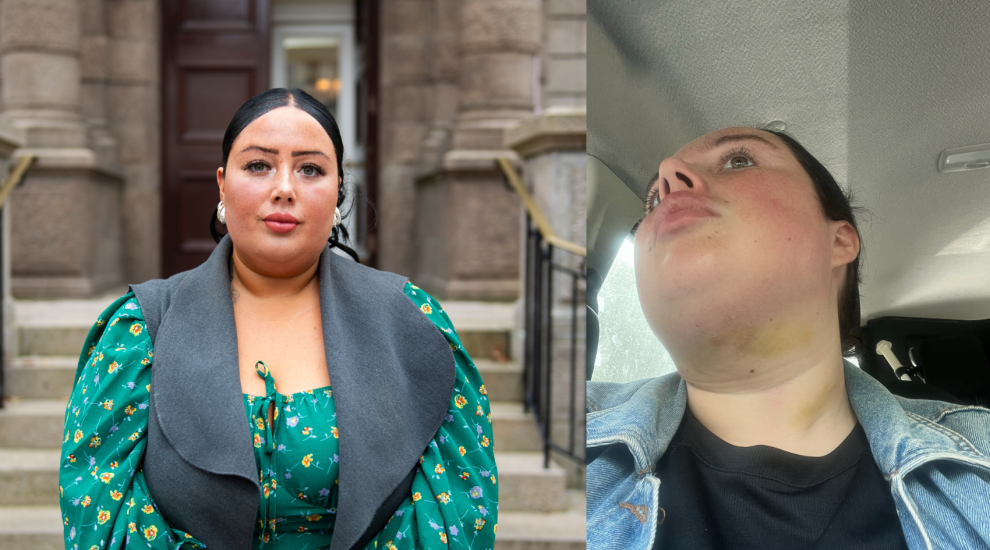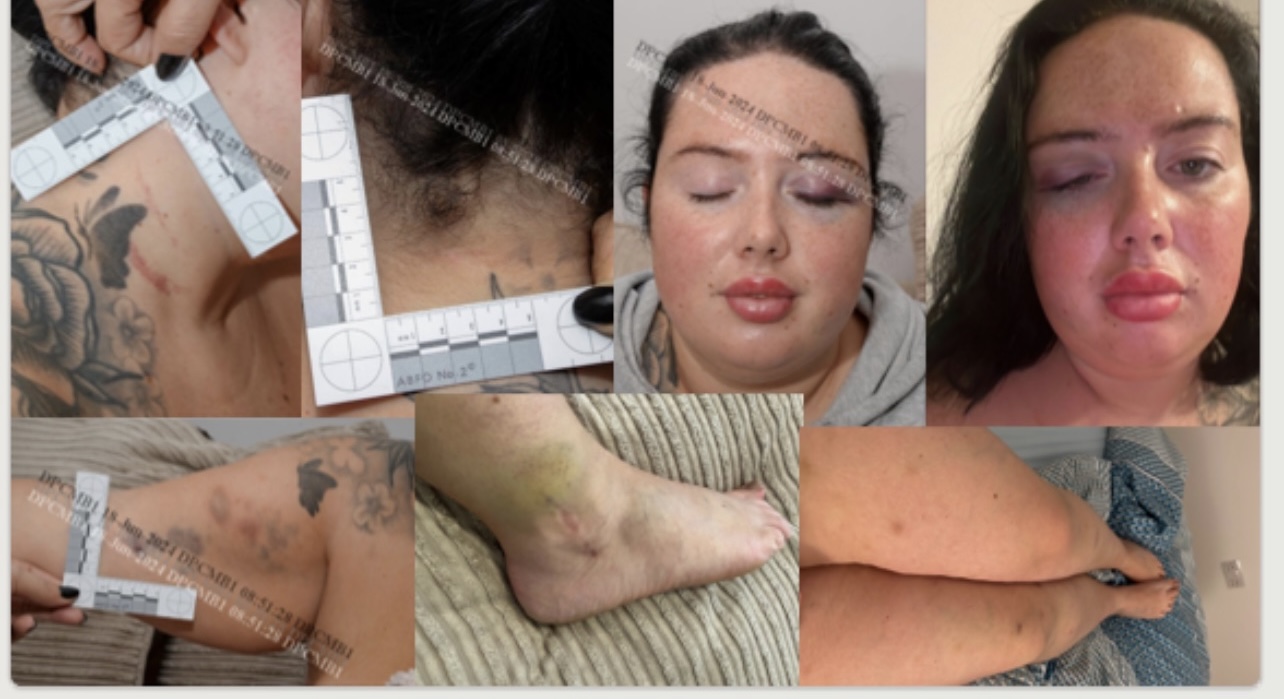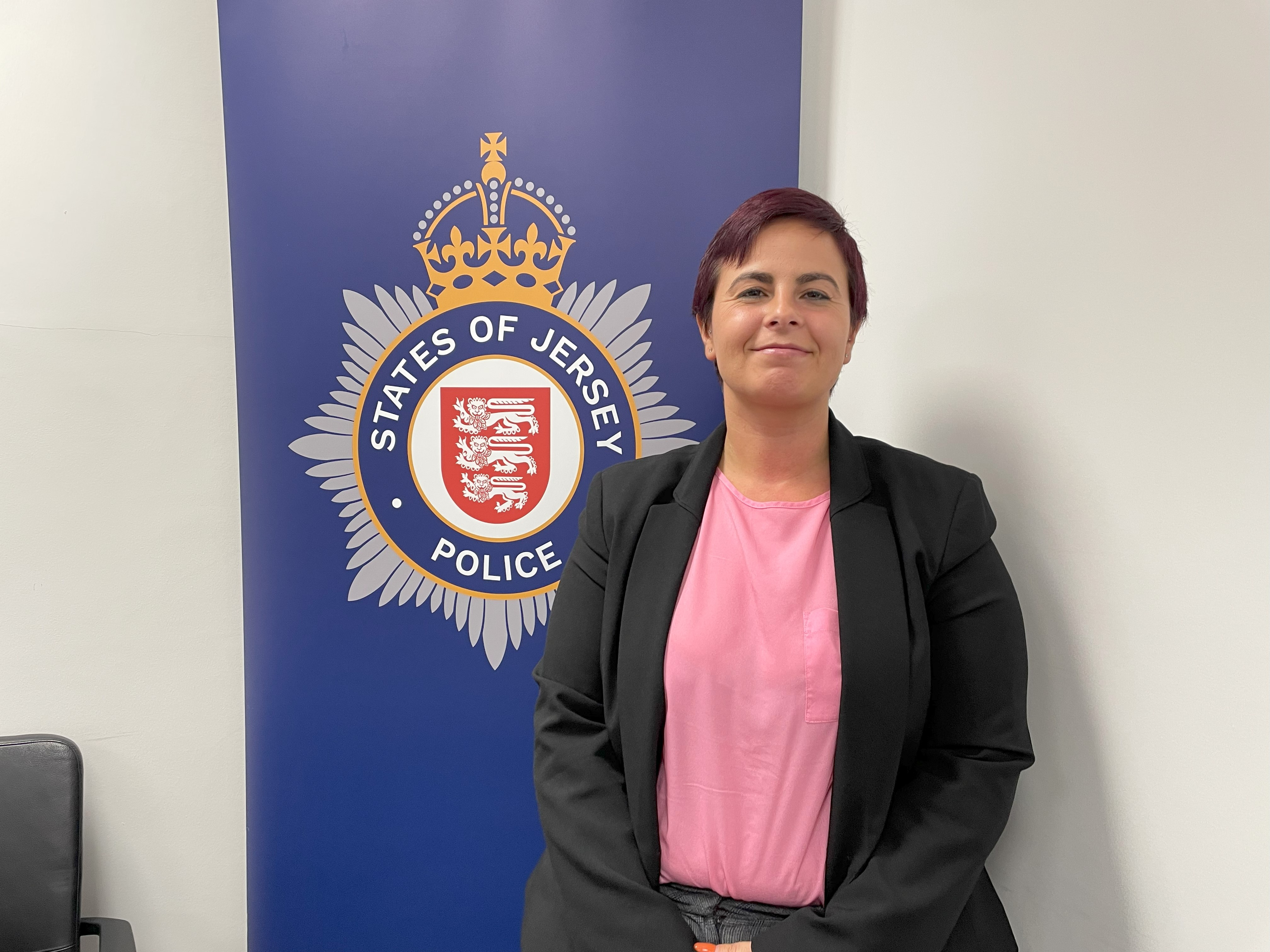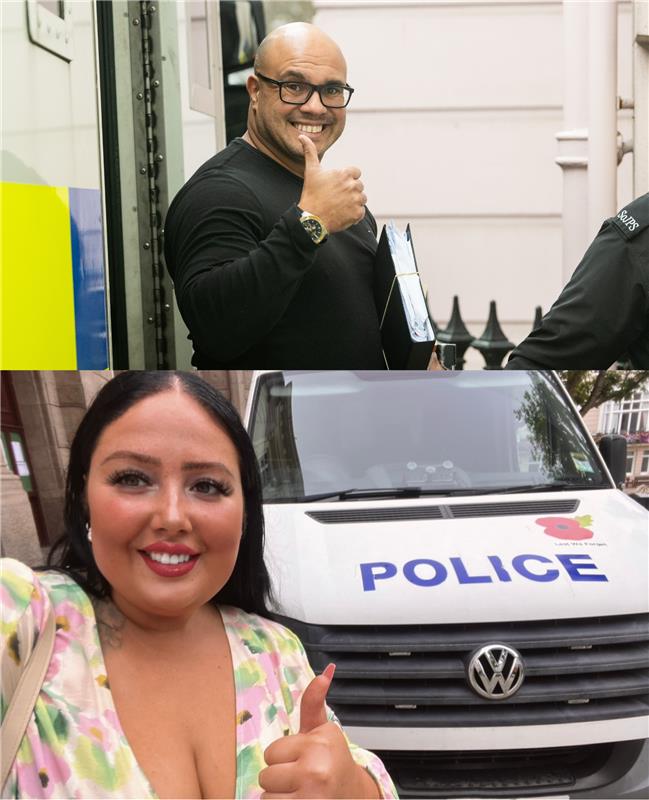


Fearing for her life at the hands of her former boyfriend and abuser, Suzie Mahe took videos she thought would be her "last testimony". Today, after her perpetrator was jailed for 15 years for a string of physical and sexual violence offences, she is bravely sharing her story to encourage other women to speak up – and start a push for legislative change to provide more protection for victims.
Gavin Roberts (45) was convicted of a list of violent offences against two women after a nine-day trial earlier this year.
At his sentencing hearing today, Roberts was described as a repeat offender who regularly got drunk and grabbed his victims around the neck – an offence for which there is no standalone offence in Jersey. This is something which Suzie would like to see changed, as well as greater awareness of the tools available for those who suffer – or fear they are at risk of – domestic abuse.
She bravely shared her story.
WARNING: This story contains graphic imagery and descriptions of rape.
When Suzie Mahe had known Gavin Roberts for just a few weeks, he wined and dined her, took her out clubbing – then strangled and hit her before the pair went home.
They had met on an app and moved in together in October 2022. Though "charming" at first, he quickly became controlling and violent, and on a night out, he got drunk and became "nasty".
Crown Advocate Matthew Maletroit, prosecuting at Mr Roberts's trial in February, explained how this was the first of a series of attacks.

Pictured: Suzie wanted to share pictures of the injuries she sustained in the assaults.
Shortly afterwards, Suzie and Gavin went on holiday to Turkey. There, they went to a club, but when Gavin saw the bill for the drinks, he became angry. At Gavin's trial, Suzie described how she saw a "look" in his face that let her know Gavin would hurt her.
Suzie is still not sure if her drink was spiked that night – regardless of what happened, instead of getting the bus back to the hotel, she disappeared into the night. During the trial, she described how she erred along the side of canals before getting a taxi back to the hotel.
When she arrived, Gavin dragged her into the lift and into the room. There, he beat her, grabbed her by the throat, and raped her. He accused her of sleeping with another man.
In court, Suzie described a brutal attack in which she was being thrown around and abused.
Two weeks after returning from holiday, again, Gavin attacked Suzie. She set up her phone to film what would happen next.
"I took these videos thinking I was going to die and that was going to be my last testimony," she said later on, looking back at the attack.
The videos show how controlling Gavin was – smashing her property, criticising her Instagram posts, and telling her: "Maybe if you behaved yourself, that wouldn't happen."
Suzie was left with visible bruises, which she hid under a jacket.
The next day, Gavin again attacked Suzie, grabbing her neck and strangling her until she struggled to breathe. She took pictures of her injuries, sent them to a friend, who called the police. Police officers attended Suzie's home, took her account, and found Gavin hiding in a bedroom upstairs, where they arrested him.
More than a year later, Gavin stood trial in the Royal Court for nine days. For four of those, Suzie gave her account of the abuse. Gavin pleaded guilty to two assaults, and a jury found him guilty of all other charges.
DC Carla Garnier, who was in charge of the investigation, explained that victims come to the police through a variety of channels, including victims coming forward or discussing their case with JDAS (though JDAS does not send them to the police), or through a friend.
In this case, a friend had made an online report and one via text, which meant that police went to check on Suzie's welfare.
DC Garnier explained: "Ordinarily, someone makes an approach to the police, and the process that follows is that they will be offered to make a complaint. In these type of cases, it will be by video and audio interview. It wouldn't be a written statement like it normally is.
"It's in those interviews, called Achieving Best Evidence, that people probably feel more at ease to talk about things, rather than telling you about it, waiting for you to write down. Things come out more freely and more times than not, it's in those interviews that things come about from the past, or things that have happened before, or concerns that they previously had and never told anyone.
"The complainant will give various lines of inquiries. Then our job as the investigating officer is to follow those lines of inquiries and try and almost corroborate what they're saying."

Pictured: DC Carla Garnier spent some 16 months working on the case, from the start of the investigation to the trial.
The fact that some of the incidents had occurred in Turkey added an extra layer of complication to the investigation.
"It was very difficult. Simple things like trying to speak to the local force or getting CCTV from the hotel, or speaking to staff members at the hotel. This was quite tricky, and in the end, there wasn't really much as a result of those inquiries, but those were inquiries that I still needed to follow," DC Garnier said.
When she learnt that Gavin had a history of domestic abuse through Clare's Law – a formal mechanism for members of the public to make enquiries about an individual who they are in a relationship with – Suzie started documenting attacks and immediately took photos of her injuries, having been assaulted the night before.
As a result of the investigation, more charges were put to Roberts – including videos found on a hard drive that were "consistent with the offence of voyeurism", DC Garnier said.
"From that, we've identified one of the ladies within the footage, and he was subsequently charged with that and pleaded guilty.
"It goes to show that one thing leads on to another.
"I'm 100% sure there's other out there that have been victims of him, and it's just a case that they can feel confident that if they do come forward, they we'll follow what we've done here."
DC Garnier commended Suzie's friend who had come raised the alarm, filing police reports. DC Garnier said: "She needs to be commended for coming forward, because [if she hadn't], I don't think Suzie would have, and if Suzie hadn't would we have had the other ladies that followed? Probably not."
For those who have suffered domestic abuse or sexual assault within a relationship, the pain doesn't end when a report is made. So, how does a survivor survive after not just the relationship, but the often years-long process for a case to be brought to court and conclude?
"It's quite hard to kind of answer that one," Suzie said, "...With the court system being how it's been, my life hasn't been able to move on. I'm rebuilding my life."
From the moment of raising the alarm, she received support from agencies like the Jersey Domestic Abuse Service, whose team of independent domestic abuse advisors and independent sexual violence advisors (IDVAs and ISVAs) help survivors navigate the system of agencies, and them decide whether they want to make a police report, and give updates from court when cases are heard.
But the case had so many implications for other areas of her life.
Suzie described having to change everything about her life – moving house, changing cars, changing her name on Facebook, and dealing with the consequences of being taken advantage of financially.

Pictured: Miss Mahe still has to avoid driving past Shinzo, the restaurant that Roberts owned.
She said navigating the landscape of other support agencies was often difficult to manage – from adult mental health services, to housing, psychologists, and charities.
And how sympathetic the individuals she engaged with were to her situation varied. She recalled being described as a "statistic" in one meeting. "I'm not a statistic, I'm a human being," she said.
Of course, the impact is more than just practical, it has also taken "such a big toll" on her family and social life.
"A lot of people sympathise... but they forget over time that you're still having to deal with all of this," she said.
Most significantly, it has harmed her physical and mental health to a level from which she may never fully recover.
The injuries she sustained in the attacks left her with an upper airway dysfunction and paradoxical vocal cord dysfunction, which she needed a nebuliser for, and which impacted her speech for a long time.
"I think my health is going to be a journey for the rest of my life, unfortunately, I'm left with lifelong injuries, and obviously mental health is huge," she said.

Pictured: Suzie took pictures of her injuries after being non-fatally strangled.
Suzie says she knows recovery is going to take time – a "really long time".
"I think acknowledging that is taking a huge step in itself," she said. "Every day, I'm still reminded. I'm still sitting on the sofa talking to you where I was strangled, I still sleep in the same bed where I was strangled.
"...When you've gone through such a horrific crime, and the process is so slow, it takes so long to build your life back."
For legal reasons, Suzie's identity was kept a secret during the trial and she would have had the right for her identity to be protected for the rest of her life.
However, with the case now at its conclusion, Susie has decided to waive her anonymity to give others the confidence to speak up.
"I'm trying to do it for others, so that other women see that they're not alone," she said.
But her ambitions go even further.
Suzie wants to raise awareness of the tools available to islanders experiencing – or who feel they may be at risk of – domestic abuse, such as Clare's Law, which will be the subject of a new Police campaign next week.

Pictured: Suzie recreating the photo of her perpetrator, Gavin Roberts, as he headed into the Royal Court for his trial.
She also wants to advocate for legislative change to enhance protections for victims. There is currently no standalone offence for non-fatal strangulation – and Suzie plans to push hard to see this changed.
"Unless people open up and and there's education around non-fatal strangulation, I don't see improvements happening quickly."
Central to starting the process of change is more education and acknowledgement of experiences like hers, particularly from Government, she said.
"These are the people who are making decisions, but not experiencing them."
Reflecting on her ordeal, Suzie said: "I think even after sentencing, I have a life sentence."
But she does not want this to define her life in a negative way.
"I'm turning 30 at the end of March, and to know that the last of my 20s has been me dealing with a man who has taken so much from me already is really hard.
"To think half of my 20s is gone, it's like I'm grieving with my life kind of disappearing – but I can only make it better."
NEXT WEEK: Express will next week be focusing on the themes of non-fatal strangulation, and the support tools, such as Clare's Law, available to those suffering abuse. Sign up to our free daily news email to be the first to read.
Former Shinzo boss jailed for 15 years for rape and assaults
Hope that case of "manipulative" restaurateur will embolden other victims
Former Shinzo owner found guilty of rape and assaults
Jury due to retire in trial of Shinzo owner accused of rape and assault
Former Shinzo boss denies alleged rape and assaults ever happened
Trial of ex-Shinzo boss accused of rape and attacks continues
Islanders affected by any of the issues raised in this report can contact any of the following:
SARC at Dewberry House provides expert independent and confidential support to victims of sexual abuse. Tel: 01534 888222.
Jersey Action Against Rape (JAAR) provide and maintain a supporting framework for survivors and their families. Confidential helpline: 01534 482800.
Freeda (formerly Jersey Women’s Refuge) offer help and support for victims of domestic abuse. Tel: 0800 7356836.
Jersey Domestic Abuse Support (JDAS) is an independent service developed to protect and support victims of domestic and sexual abuse. Tel: 01534 880505.
Victim Support offer free and confidential advice to victims of crime. Tel: 01534 440496.
Victims First Jersey is a free and independent service offering confidential support to victims and witnesses of crime. Tel: 0800 7351612.
Samaritans offer a confidential and non-judgemental listening ear to people who need to talk. Tel: 116 123 free from any phone or 0330 094 5717 (local call charges apply).
Comments
Comments on this story express the views of the commentator only, not Bailiwick Publishing. We are unable to guarantee the accuracy of any of those comments.